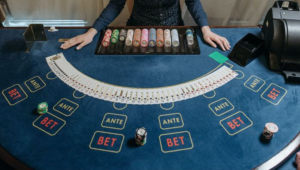On popular poker websites, multi-table tournaments (MTTs) rely on robust server infrastructure to handle high volumes of players and extensive data traffic efficiently. This infrastructure allows platforms to manage thousands of participants concurrently, ensuring an uninterrupted flow of games without delay. Software stability is equally important. The extended duration of these tournaments necessitates software that can maintain performance without crashing and handle player movements seamlessly between tables as eliminations occur. These resources ensure the tournament flow remains efficient for every participant engaged in the gameplay.
Additionally, poker websites rely heavily on Random Number Generators (RNGs), which play a crucial role in maintaining fairness and integrity across platforms. These generators ensure each hand is unique and unbiased by randomly shuffling decks and dealing cards. Rigorous testing and certification of RNG systems prevent predictability and provide players with a genuine and fair gaming experience.
The Role of Advanced Tools in Multi-Table Tournaments
MTTs have grown more advanced with the integration of tools that assist players in making strategic decisions. Tools like GTO Wizard AI and POSTFLOPIZER provide real-time analysis by using algorithms that simulate outcomes based on player stack size, pot odds, and tournament stage. These tools make real-time decisions more accessible and efficient in fast-paced environments with multiple tables, especially as players juggle multiple scenarios in split seconds.
Many players use these tools to help refine their poker strategies. In addition to these tools, poker websites also offer instructional resources or direct player coaching through AI-driven feedback, helping users find poker games online to practice and enhance their skills. These innovations shape the competitive environment of poker tournaments, empowering players to engage with the game more strategically and enhancing their skills as they practice and compete.
Essential Features in Multi-Table Tournaments
Dynamic table management is a crucial feature within multi-table tournaments. The software automatically adjusts tables to maintain balance as players are progressively eliminated, equitably redistributing the remaining players across available tables. Prize pool distribution also relies on sophisticated algorithms. As player buy-ins accumulate into a shared pool, automated systems calculate payouts based on tournament structures and the total number of participants.
Leaderboards are another essential aspect, giving players real-time access to rankings, chip counts, and projected earnings. This feature enhances engagement and provides strategic insights to guide players’ decision-making throughout the game. Additionally, time banks are incorporated to provide players with extra time for critical decisions, ensuring thoughtful play without compromising the tournament’s pace.
Security and Fair Play Mechanisms
Security measures are critical to establishing trust and reliability on online poker platforms. Advanced security algorithms, using machine learning and deep learning technologies, help detect anomalies and prevent unethical strategies that could compromise game integrity. These systems can identify bots, collusion, or other unfair practices. As MTTs attract more players, ensuring a level playing field becomes paramount to maintaining a healthy online poker environment.
Artificial Intelligence also enhances the gaming experience by offering strategic coaching through gameplay analysis. Personalized feedback is provided to refine player skills, with AI-driven insights helping players make more informed decisions. These tools ensure games remain competitive and balanced, even as technology shapes the dynamics of online poker.
Technological Enhancements and Emerging Trends
The integration of cutting-edge technologies like Virtual Reality (VR) and Augmented Reality (AR) is gradually transforming online poker, bringing the immersive feel of traditional, in-person games to online environments. VR allows players to interact in a simulated live poker setting, adding depth to the online poker experience, while AR can overlay strategic insights directly within the player’s view. These innovations create more engaging and realistic environments, driving greater player engagement in MTTs.
Moreover, blockchain technology is emerging as a tool for ensuring transparency in financial transactions, providing secure and timely payouts to participants. Decentralized platforms leverage these technologies to support peer-to-peer interactions and optimize efficiency within the tournament structure. As these advancements continue to develop, the landscape of MTTs will evolve, potentially reshaping the online poker industry by prioritizing security, transparency, and immersive experiences.
Strategies for Effective Multi-Tabling
Effective multi-tabling requires strategic approaches and optimized tools. Many players choose to play at lower stakes when managing numerous tables simultaneously, as this helps minimize risk while maintaining focus. Software tools that support rapid table identification, hotkeys, and efficient note-taking systems further enhance gameplay, allowing players to quickly record essential information about opponents, betting patterns, and hand histories. By managing multiple games more efficiently, players can maximize their performance and achieve better outcomes over time.
The use of HUDs (Heads-Up Displays) is also popular among players for tracking stats in real time across tables. HUDs display crucial metrics like opponents’ VPIP (Voluntarily Put Money in Pot) and PFR (Pre-Flop Raise), offering insights into opponents’ tendencies. These metrics allow players to make strategic adjustments as they multi-table, supporting better decision-making across simultaneous games.
Conclusion
The technology supporting multi-table tournaments on online poker platforms has significantly enhanced the gaming experience, combining robust server infrastructure, fair play mechanisms like RNGs, advanced player support tools, and immersive technologies like VR and AR. With a focus on security, transparency, and player engagement, these platforms have created a dynamic and competitive environment that caters to players of all levels. As the industry continues to embrace technological advancements, online poker will likely see even greater innovations, ensuring that players can enjoy a fair, immersive, and skill-oriented experience across multiple tables. The future of online poker, especially in multi-table tournaments, is poised to blend tradition with technology, enriching gameplay for a global audience.
To read more, Click Here

